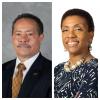news
Georgia Tech Diversity, Equity, and Inclusion Council Formed to Further Address Campus Disparity, Bias, and Inequity
Primary tabs
More than 50 representatives from across the campus have been appointed by President Ángel Cabrera to the newly formed Georgia Tech Diversity, Equity, and Inclusion Council (GTDEIC). The Council will identify issues of campus racial and gender disparity, bias, and inequity to be addressed in order to deliver upon the Institute’s vision of diversity and inclusion. The members represent diverse voices and perspectives from staff, faculty, and students. Their initial meeting will be Nov. 30.
The GTDEIC will continuously monitor and assess the Institute’s progress on achieving its goals for becoming a model campus community for diversity, equity, and inclusion and develop evidenced, informed recommendations, which they will submit periodically to Cabrera and the Institute’s Executive Leadership Team for consideration in developing strategic actions.
“Our Diversity and Inclusion Council is one of several action steps announced this past summer to deliver on our promise of inclusion,” said President Cabrera. “As outlined in our new strategic plan, we are striving to remove barriers to access and success, and to build an inclusive community where people of all backgrounds have the opportunity to learn and contribute to our mission. I am grateful to the individuals who volunteered to serve as inaugural council members, and look forward to working closely with them as they identify issues and propose new courses of action.”
Campus research has revealed discrepancies in the satisfaction levels of various groups. The 2017 Faculty and Staff Climate Assessment Surveys and 2018 Student Climate Assessment Survey revealed high levels of faculty, staff, and student satisfaction on a wide array of campus experiences on a number of dimensions measured across multiple social identities, such as faculty rank, job function, gender, and race.
“The surveys also revealed there are some important differences in levels of satisfaction reported regarding some campus experiences,” said Archie Ervin, vice president for Institute Diversity, Equity, and Inclusion (IDEI). “Disaggregation of the data by social identity reveal lower levels of satisfaction with campus experiences on a number of dimensions measured by the survey that deserve attention and deeper exploration to understand why the differences exist and what action steps, if any, could be taken to address root causes of problematic or potentially adverse differences of experiences for campus members.”
“In sum, the climate assessment reports help us to understand our strengths and suggest areas where we should focus our attention to improve experiences of some members of the Tech community,” Ervin added. “Given the baseline data obtained by the Climate Assessment Surveys, and the recent development of college-level diversity councils, the establishment of an Institute-wide council on diversity, equity, and inclusion is both timely and necessary for the next iteration of an improved overarching strategy to achieve Tech’s goals for diversity and inclusion.”
The GTDEIC will be charged with the following objectives:
- Provide a forum for Georgia Tech stakeholders representing all divisions of the Institute to identify and consider forward-looking, proactive strategies, methods, and approaches to enhance diversity, equity, and inclusion practices and outcomes at Georgia Tech;
- Create a setting in which Institute leadership can share and vet diversity, equity, and inclusion-related issues and opportunities; and
- Develop data-informed recommendations to improve diversity, equity and inclusion and allow the Institute to lead by example as a model institution advancing inclusive innovation.
The group will be chaired by Ervin, and Pearl Alexander, executive director of IDEI’s Staff Diversity, Inclusion, and Engagement, will serve as vice chair. The GTDEIC is composed of representatives from across the campus academic and administrative units, faculty, staff and student governance (undergraduate and graduate) and other faculty and staff who enhance the diversity of perspective of the Council.
In addition to Ervin and Alexander, council members include the following:
Chaouki Abdallah, Maryam Alavi, Sonia Alverez-Robinson, Nelson Baker, Terry Blum, Sandi Bramblett, Barrett Carson, Kim Cobb, Cheryl Cofield, Carol Colatrella, Melanie DeMaeyer, Lynn Durham, Shoshanna Engel, Kaye Husbands Fealing, Bonnie Ferri, Byron Fitch, Kelly Fox, Mary Frank Fox, Steven French, Steven Girardot, Rebecca “Beki” Grinter, Martha Grover, Lea Harris, James Hudgens, Joe Hughes, Javier Irizarry, Charles Isbell, Laurence Jacobs, Denise Johnson-Marshall, Paul Kohn, Renee Kopkowski, Keona Lewis, Brielle Lonsberry, Susan Lozier, Joe Ludlum, Steve McLaughlin, Joseph Montoya, Tegra Myanna, Frank Neville, Loraine Phillips, Dana Randall, Stephanie Ray, Elora Raymond, Catherine Ross, David Ross, Leslie Sharp, Todd Stansbury, John Stein, Yuanzhi Tang, Frank Trammer, Richard Utz, and Mitchell Walker.
Groups
Status
- Workflow Status:Published
- Created By:jhunt7
- Created:11/30/2020
- Modified By:jhunt7
- Modified:11/30/2020
Categories


